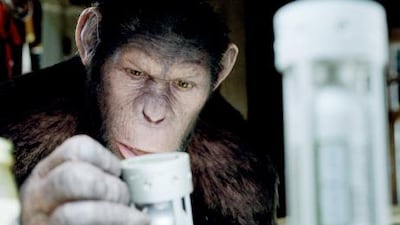Whether towering above the Manhattan skyline in King Kong, swinging in The Jungle Book, or battling extinction in Gorillas in the Mist, apes have enjoyed a long and varied habitation in cinema. And their popularity seems to be growing.
Tomorrow sees the release of the big-budget sci-fi reboot, Rise of the Planet of the Apes, telling the story of primates overturning the dominance of man. From the last week of July and through most of August, the comedy Zookeeper, "a buddy movie where the buddy is a gorilla", as the Chicago Sun-Times' Roger Ebert put it, was a steady feature on UAE movie screens. And proving a hit at film festivals is documentary Project Nim, about an attempt to teach sign language to a chimpanzee.
Jungle-dwelling primates got their first foothold in Hollywood thanks to the Tarzan movies. Based on the novels of Edgar Rice Burroughs about a human child raised by African great apes who becomes a tree-swinging hero, the Internet Movie Database lists an incredible 89 movies with Tarzan in the title between 1918 and 2008. Because using real animals in the movies was considered too dangerous and costly, the films helped popularise the actor-operated "ape suit".
"There is hardly an American male of my generation who had not at one time or another tried to master the victory cry of the great ape," the author Gore Vidal wrote in Esquire of his love of all things Tarzan, "while a thousand arms and legs were broken by attempts to swing from tree to tree in the backyards of the republic."
But while the idea of man living alongside ape created great drama, it also made fantastic comedy. In the 1932 Laurel and Hardy farce The Chimp, the bumbling duo were put out of work by a circus company and given a gorilla called Ethel (rather than a chimp, as the title might suggest) as compensation. Their attempt to smuggle the animal into their hotel room - by dressing her in a ballet tutu and hat - became one of the pair's most enduring visual gags.
"Apes are very close to us, so when we look at them, we see ourselves. They move similarly, they appear to mimic certain facial expressions and so on," says Max Reuter, an evolutionary geneticist at University College London.
"At the same time, they are wild animals and they don't have all the social norms and ways of responding to our behaviour that we would expect from another human being. The percentage of genes that humans and chimpanzees share, if you look at the genome sequence, is more than 95 per cent. That is why we find them fascinating."
Project Nim, made by James Marsh, the Oscar-winning director of Man on Wire, examines the story of Nim Chimsky, a chimpanzee who was raised as a human in the 1970s and mastered 125 words of American sign language.
The film examines the questionable scientific bases for the experiment, which saw Nim taken from his captive mother and raised by adoptive human parents who not only breast-fed him, but allowed him to smoke marijuana and drink beer. With Nim growing increasingly violent as he reached adolescence, the scientists discovered that chimpanzees, which are five times stronger than humans of the same weight, could never be fully domesticated.
While there is no shortage of lovable apes in the movies, their most famous appearances have been as man's adversaries.
Primates act as a device to provide human introspection in the Planet of the Apes films. The 1968 original sees Charlton Heston as an astronaut who believes he has crash-landed on an alien world, governed by tyrannical apes. Eventually, it is revealed that he has arrived in Earth's future, when man's short-sightedness has led to his downfall. Exactly how this happened will be revealed in Rise of the Planet of the Apes, the seventh film in the franchise, starring James Franco and Freida Pinto and opening in the UAE on Thursday.
Unlike previous entries in the series, latex masks and hairy suits have been dispensed with and instead the motion-capture technology that created Gollum in the Lord of the Rings movies will be used to create the titular apes, while Gollum actor Andy Serkis has been drafted in to "play" their ringleader, Caesar.
Although a thoroughly unscientific depiction of an ape, the oversized gorilla King Kong is perhaps Hollywood's most iconic monster, angrily scaling the Empire State Building in 1933, 1976 and again in 2005. The story sees Kong taken against his will from his home, Skull Island, and displayed as an exotic wonder in New York. His escape from captivity represents the awesome, uncontrollable power of nature, while his death signifies an uneasy relationship between man and the natural world, which remains resonant to this day.

